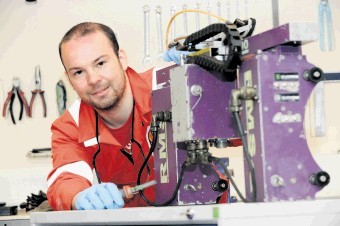
Had it not been for a career in the oil industry, 27-year-old Graeme Falconer, from Garthdee, would have liked to be an astronaut.
His alternative career ambitions certainly haven’t put him off his career at CAN Offshore, where he is a rope access specialist non destructive testing (NDT) technician.
Indeed, the young technician has already been recognised by the industry. He was a runner-up in this year’s Oil & Gas UK Awards Young Technician of the Year Award, along side Kevin McDonald, from Flexlife, and award winner John Piper, instrument technician at BP – both already featured here.
Why did you choose your career in the industry?
I chose this career as it looked interesting and different and came with opportunities to travel around the globe.
With my background in physics I thought I’d have a bit of a head start in terms of training, as a lot of the techniques used in NDT rely on a good knowledge of science, namely electro magnetic, radiography and ultrasonics.
Who or what has influenced you most in your career to date?
CAN offshore gave me a start and it’s through their commitment to training and putting faith in young newcomers that I’ve had the chance to even do this. When I first started, the office wasn’t as big as it is today and it gave you a great to chance to get to know everyone. I think this close-knit feeling made me feel very at ease and gave me the confidence to approach the job and try to impress colleagues with hard work and professionalism, with a view to climbing the ladder.
I’ve had first class training and experience from my supervisors over the years; Mirsad Alagic and Conor Douglas were both very qualified and experienced techs and gave me some really valuable insights to the industry and have really shaped me to be the tech I am today.
Where do you see your career going?
I’m very happy doing what I do now but I do want to go as far as my abilities take me. I see myself in an office role in the future, maybe management or training. I enjoy helping newcomers, passing on everything I’ve learned and how to approach clients and workscopes.
What advice would you give to others looking to get in to the oil industry?
I was quite lucky with CAN in that they often look to take new starts on and put them through their base NDT training, giving them the confidence to go out to perhaps more important and bigger jobs. Nepotism is definitely apparent in the industry and knowing someone is always a huge help, but I find companies look for folk who take initiative, like perhaps doing some courses and get the right training to show that you’re committed. Having no experience is a drawback but if you show companies you’re keen and able it will put you in good stead.
If you weren’t doing the job you are in now, what else would you be doing?
An astronaut.
Recommended for you
